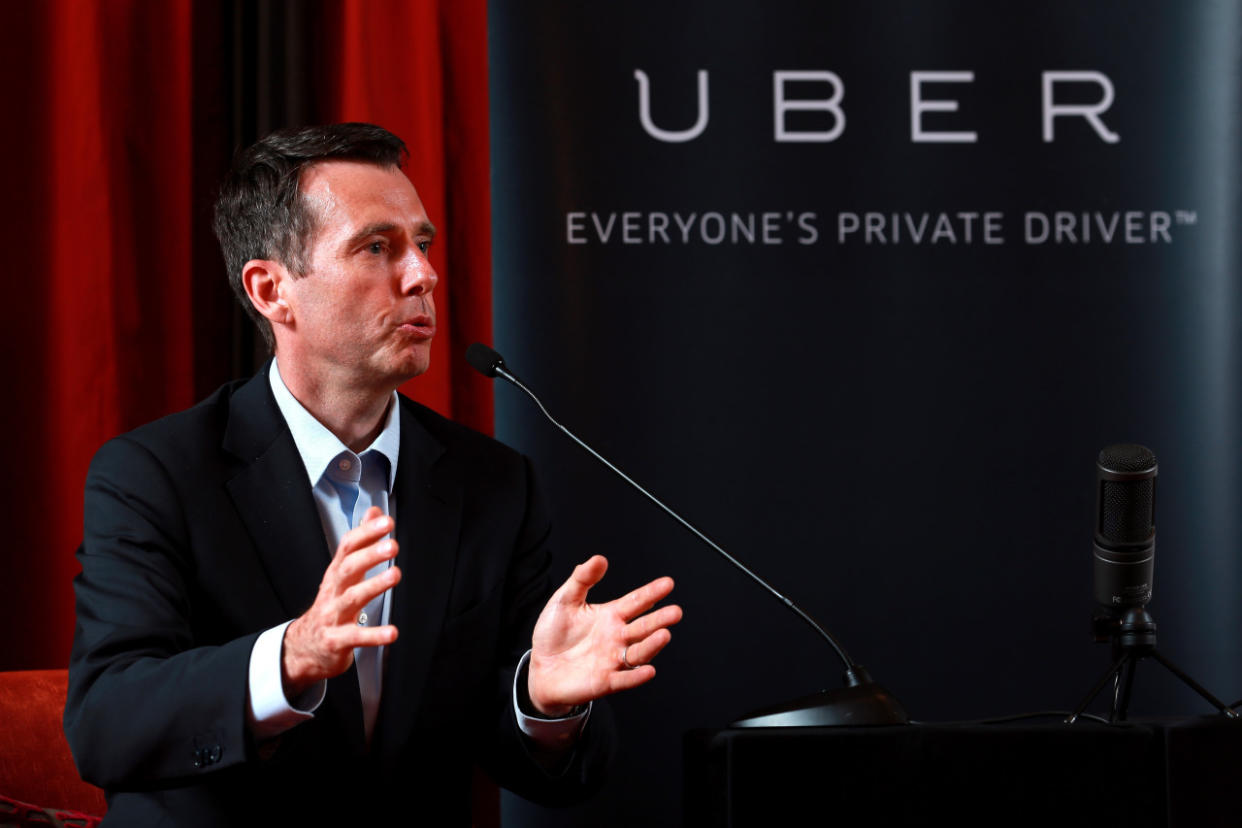David Plouffe engineered Hillary Clinton’s defeat in 2008. Here’s how he thinks she will beat Bernie Sanders.

David Plouffe, Uber SVP, speaks in a fireside chat in April in Dubai. (Photo: Warren Little/Getty Images)
LAS VEGAS — Just days before the crucial Nevada caucus, David Plouffe, one of America’s top political strategists, assessed the Democratic race succinctly.
“Hillary Clinton is going through a tough time,” Plouffe told Yahoo News.
Plouffe should know. As the manager of Barack Obama’s successful 2008 campaign, he was, more than anyone else, the chief architect of the toughest time in Clinton’s career — the long, losing delegate slog that wound up propelling Obama to the presidency instead of Clinton.
Now some observers see history repeating itself, with another unlikely grassroots challenger threatening to derail Clinton’s White House dreams. The latest Nevada polls show that Vermont Sen. Bernie Sanders has cut Clinton’s lead to 2.4 percentage points, on average, down from more than 20 percentage points late last year.
There are, however, some differences this time, according to Plouffe. For one thing, he himself isn’t advising the challenger. Plouffe, who served as a senior adviser in the Obama White House and now works for Uber, is supporting Clinton. He believes that she is more like Obama than Sanders is. He wants Clinton to attack Sanders as a middle-class tax-hiker. And he thinks he knows how Clinton is going to win the nomination — eventually.
“I’ve always believed March was going to be Hillary Clinton’s month,” Plouffe said.
What follows is an edited version of Plouffe’s conversation with Yahoo News:
Yahoo News: In 2008, Hillary beat Obama in Nevada.
David Plouffe: Yep. We won the delegates, but she won the raw vote. By six points. It was a devastating night for us.
So why isn’t she winning this time? Why is the race tightening?
I think it’s natural, especially in a caucus state. Sanders has tapped into something. He’s exceeded everyone’s expectations, probably including his own. Momentum is a powerful thing in politics. And he’s been able to generate it. Still, I think both campaigns would tell you they have less certainty about what’s going to happen here than they did in Iowa and New Hampshire. ’Cause it’s a harder thing to get a bead on.
What do you expect to happen?
It’s going to be very close. If it’s a sky-high turnout, that’s good for Sanders. Most of the new entrants … some of them will go to Hillary, but he’ll probably win more of them.
Sanders has a lot of grassroots organization. You know, we did very well up north. I think Sanders will do well in Washoe County and some of those northern counties. Clinton’s strength is here in Clark County [home of Las Vegas], and I think that’s where they’re focusing. Can they have the kind of margin against him that they had against us? It just got away from us down here. She won by more than we had anticipated.
Which voters put her over the top in 2008?
It’s union, it’s Latinos, it’s suburban women. It’s all sorts. It’s a melting pot. It’s a good test.
Whether it’s Hillary by five points or two points or Sanders by two points in Nevada, though, I don’t think that really upsets the apple cart in South Carolina. But it makes next week very important. If Clinton doesn’t win big in South Carolina … she has to do well there.
Slideshow: Clinton and Sanders go head-to-head in Nevada >>>

Hillary Clinton meets Nevada voters in the Rio Hotel Suites and Casino’s employee cafeteria in Las Vegas on Thursday. (Photo: Melina Mara/The Washington Post via Getty Images)
So let’s game this out. Nevada is close. Clinton maintains her big lead in South Carolina. Then what?
I’ve always believed March was going to be Hillary Clinton’s month. She had to endure a tough February. I think she’ll do well in South Carolina, though that will tighten too. She’ll use that as a springboard into March 1. The Texases of the world, the Georgias of the world — they become very important. Michigan becomes very important on March 8. And then March 15 is, I think, the most important day on the calendar — those large Midwestern and Southern states (Florida, Illinois, Missouri, North Carolina, Ohio), where I think she will do very well.
I still think she’s very well-positioned. Listen, Trump may be the one person who waltzes to a nomination. But think about ’08 — we lose New Hampshire and Nevada. My goodness. Most of the political world thought that order had been restored. We had our backs against the wall. That’s happened to all of our recent presidents. They’ve all had their moment of trial. But my suspicion is that on the morning of March 16, Clinton will be in a very strong position in this race.
Do you anticipate another delegate grind after that?
I don’t know. Sanders has a lot of money and a lot of grassroots support, so he’ll be able to go on. But if she wins what she should on March 15 — and I think she could win all of those March 15 states — at that point, her pledged delegate lead gets to a point where it’s hard for Sanders to pull it out. So the burden is on Sanders. He’s got to win in a bunch of places he’s not expected to.
But he’s already showing that he can do that in Nevada, isn’t he?
Yeah. But he’s got to keep winning.
So you don’t see Sanders as the Obama of 2016?
Sanders’ people say, “Well, the same things Hillary is saying about us, she said about Obama.” But our plans were not dead on arrival. In fact, what the president implemented is largely what he campaigned on. So that’s where the comparison breaks down.
And his turnout so far has not been impressive at all. So I don’t see any sign that he’ll be able to change the electorate in a fundamental way.
What about this argument that the president can’t get much done with a Republican Congress, so whatever Hillary says about how she’s going to be more pragmatic and practical is irrelevant — and in that case, why not vote for the idealist…
…who will get nothing done. Nothing.
They’re wrong about the president not being able to get anything done. Let’s call the roll. Health care for all. Remarkable achievements on global warming. Equality for gays and lesbians. Diplomacy over war. Saving the American auto industry and keeping us from a depression. Making our tax code more progressive.
Those are some of the most consequential accomplishments of the last century. Bernie Sanders’ plans are dead on arrival with Democrats in Congress. Democrats.
Why? Because his plans would be politically challenging for them back home?
Because they don’t agree with them substantively. I have a lot of admiration for what Sanders has built. It’s a remarkable political story. He’s out of central casting for this moment. Who would have thought?
But I have big substantive problems with his plans. What he’s focused on is how we deal with economic inequality, and his answer is to raise taxes on the middle class to fund single-payer health care. Really? That’s interesting. I think it’s absurd that we would deal with income inequality by raising taxes on the very people who are struggling. And that’s an important part of the debate that needs to be injected in.


